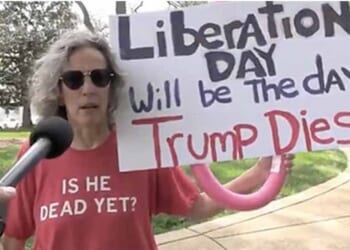On Tuesday, Treasury Secretary Scott Bessent warned China that their imposition of a 34% tariff on the United States was a “big mistake.”
Last Wednesday, President Donald Trump imposed an additional 34% tariff on all Chinese goods imported into the U.S. On Friday, China announced it would impose a reciprocal 34% tariff on all imports from the United States starting April 10. On Tuesday, Trump responded by announcing that the U.S. would apply an additional 50% tariff on imports from China if the Chinese don’t withdraw the 34% tariff.
“My advice on April 2 to our trading partners was not to panic, don’t escalate, and then we will see where President Trump is after a period of days or weeks,” Bessent said on CNBC’s “Squawk Box.” “The response was overwhelming, so after a period of days, he decided that it would be a good time to begin negotiating.”
“The academic literature shows that it’s actually the non-tariff barriers which are both harder to quantify and harder to — they’re more insidious because they’re hidden, they’re obfuscated. So tariffs, non-tariff barriers, currency manipulation and then subsidies to both labor and industry … everything’s on the table,” he explained.
“If we put up a tariff wall, the ultimate goal would be to bring jobs back to the U.S., but in the meantime, we will be collecting substantial tariffs,” he said. “If we’re successful, tariffs would be a melting ice cube, in a way, because you’re taking in the revenues as the manufacturing facilities are built in the U.S., and there should be some level of symmetry between the taxes that we begin taking in with the new industry from the payroll taxes as the tariffs decline.”
“Many of our trading partners, they have queued up, and they have kept their cool,” he revealed. “They have not escalated, and they will get priority in the queue. I think it was a big mistake, this Chinese escalation, because they’re playing with a pair of twos. Traditionally, if you look at the history of the trade negotiations, we are the deficit country. So what do we lose by the Chinese raising tariffs on us? We export one-fifth to them of what they export to us, so that is a losing hand for them.”
“We can see from the huge surpluses that some of these countries have; they’ve accumulated these gigantic surpluses over the years. That has to tell all of us that there are imbalances, and again, whether those imbalances are from the actual tariffs or non-tariff barriers, currency manipulation, or the state-favored funding, it’s very difficult to disentangle, but those big surpluses tell me that there is a large imbalance, and President Trump is committed for the American worker to fixing those imbalances,” he declared.
“I think you are going to see some very large countries with large trade deficits come forward very quickly,” Bessent said. “If they come to the table with solid proposals, I think we can end up with some good deals.”











